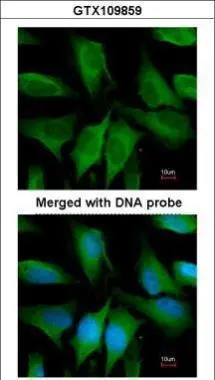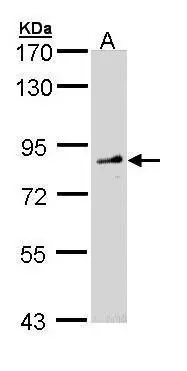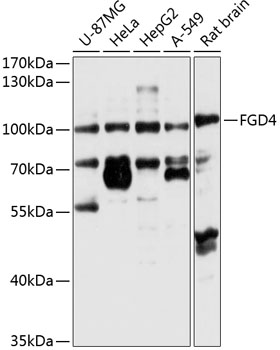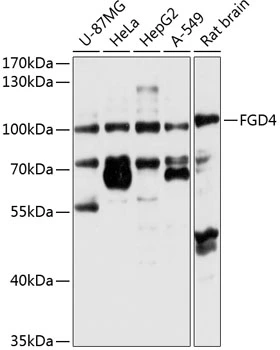![FGD4 antibody [N1N3] detects FGD4 protein at cytoplasm in human endometrial cancer by immunohistochemical analysis. Sample: Paraffin-embedded human endometrial cancer. FGD4 antibody [N1N3] (GTX109859) diluted at 1:500.
Antigen Retrieval: Citrate buffer, pH 6.0, 15 min FGD4 antibody [N1N3] detects FGD4 protein at cytoplasm in human endometrial cancer by immunohistochemical analysis. Sample: Paraffin-embedded human endometrial cancer. FGD4 antibody [N1N3] (GTX109859) diluted at 1:500.
Antigen Retrieval: Citrate buffer, pH 6.0, 15 min](https://www.genetex.com/upload/website/prouct_img/normal/GTX109859/GTX109859_40030_20150424_IHC_2_w_23060500_552.webp)
FGD4 antibody [N1N3] detects FGD4 protein at cytoplasm in human endometrial cancer by immunohistochemical analysis. Sample: Paraffin-embedded human endometrial cancer. FGD4 antibody [N1N3] (GTX109859) diluted at 1:500.
Antigen Retrieval: Citrate buffer, pH 6.0, 15 min
FGD4 antibody [N1N3]
GTX109859
ApplicationsImmunoFluorescence, Western Blot, ImmunoCytoChemistry, ImmunoHistoChemistry, ImmunoHistoChemistry Paraffin
Product group Antibodies
ReactivityHuman
TargetFGD4
Overview
- SupplierGeneTex
- Product NameFGD4 antibody [N1N3]
- Delivery Days Customer9
- Application Supplier NoteWB: 1:500-1:3000. ICC/IF: 1:100-1:1000. IHC-P: 1:100-1:1000. *Optimal dilutions/concentrations should be determined by the researcher.Not tested in other applications.
- ApplicationsImmunoFluorescence, Western Blot, ImmunoCytoChemistry, ImmunoHistoChemistry, ImmunoHistoChemistry Paraffin
- CertificationResearch Use Only
- ClonalityPolyclonal
- Concentration1 mg/ml
- ConjugateUnconjugated
- Gene ID121512
- Target nameFGD4
- Target descriptionFYVE, RhoGEF and PH domain containing 4
- Target synonymsCMT4H, FRABP, ZFYVE6, FYVE, RhoGEF and PH domain-containing protein 4, FGD1 family, member 4, FGD1-related F-actin-binding protein, actin-filament binding protein frabin, zinc finger FYVE domain-containing protein 6
- HostRabbit
- IsotypeIgG
- Protein IDQ96M96
- Protein NameFYVE, RhoGEF and PH domain-containing protein 4
- Scientific DescriptionThis gene encodes a protein that is involved in the regulation of the actin cytoskeleton and cell shape. This protein contains an actin filament-binding domain, which together with its Dbl homology domain and one of its pleckstrin homology domains, can form microspikes. This protein can activate MAPK8 independently of the actin filament-binding domain, and it is also involved in the activation of CDC42 via the exchange of bound GDP for free GTP. The activation of CDC42 also enables this protein to play a role in mediating the cellular invasion of Cryptosporidium parvum, an intracellular parasite that infects the gastrointestinal tract. Mutations in this gene can cause Charcot-Marie-Tooth disease type 4H (CMT4H), a disorder of the peripheral nervous system. [provided by RefSeq]
- ReactivityHuman
- Storage Instruction-20°C or -80°C,2°C to 8°C
- UNSPSC12352203



![FGD4 antibody [N1N3] detects FGD4 protein at cytoplasm in human lung cancer by immunohistochemical analysis. Sample: Paraffin-embedded human lung cancer. FGD4 antibody [N1N3] (GTX109859) diluted at 1:500.
Antigen Retrieval: Citrate buffer, pH 6.0, 15 min FGD4 antibody [N1N3] detects FGD4 protein at cytoplasm in human lung cancer by immunohistochemical analysis. Sample: Paraffin-embedded human lung cancer. FGD4 antibody [N1N3] (GTX109859) diluted at 1:500.
Antigen Retrieval: Citrate buffer, pH 6.0, 15 min](https://www.genetex.com/upload/website/prouct_img/normal/GTX109859/GTX109859_40030_20150424_IHC_w_23060500_338.webp)



